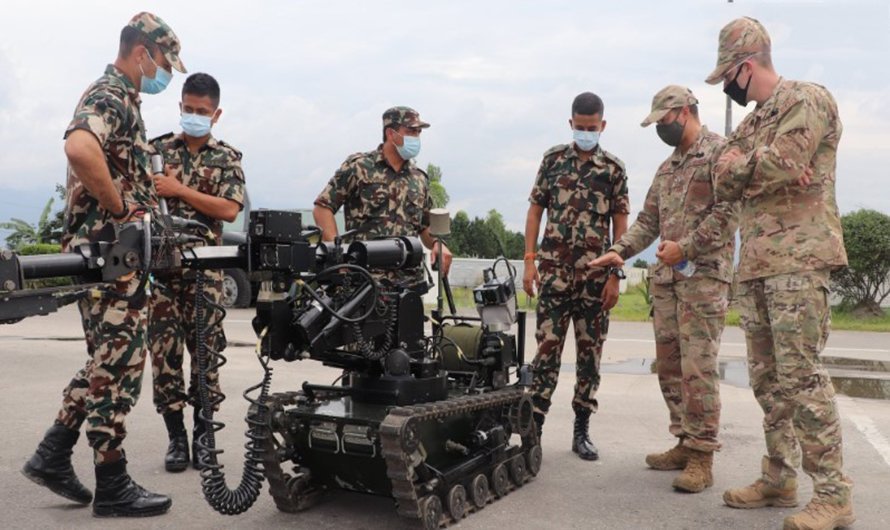
Amid volatile regional and international geopolitics, defence diplomacy is a vital tool of Nepal’s foreign policy. The 2015 Constitution affirms Nepal’s non-aligned orientation and commitment to peace. Nepal’s security forces—the Nepal Army, Nepal Police, Armed Police Force (APF), and National Investigation Department (NID)—engage with foreign counterparts and the United Nations to help maintain peace and security regionally and worldwide.
Former U.S. President John F. Kennedy said, “Diplomacy and defense are not substitutes for one another. Either alone would fail.” For Nepal, defence diplomacy is a key means of engaging foreign militaries in support of broader foreign-policy objectives; it will remain pivotal in advancing national interests.
Nepal’s 2016 National Security Policy assigns the Nepal Army responsibility for developing military technology, strengthening self-reliance in defence production, and fostering relationships with neighbouring countries. The policy also underscores coordination through the Ministry of Defence in managing military attaché activities abroad—an essential mechanism for advancing Nepal’s defence interests diplomatically.
Nepal’s 2020 Foreign Policy further articulates broader diplomatic aspirations: strengthening bilateral ties based on sovereign equality, enhancing Nepal’s global representation, promoting disarmament, and fostering regional peace and cooperation. These objectives align with Nepal’s expanding defence engagement.
The Nepal Army stands at the forefront of the country’s defence diplomacy. Bilateral visits and engagements, participation in joint exercises, deployment of defence attachés, UN peacekeeping operations across the globe, and bilateral as well as multilateral seminars and programs all serve as instruments of military diplomacy.
Nepal currently maintains diplomatic relations with 183 countries. It has posted defence attachés in key nations such India, China, the United States, the United Kingdom, Bangladesh, and Pakistan, and at Nepal’s Permanent Mission to the United Nations in New York. These attachés act as bridges between Nepal’s armed forces and those of friendly countries, facilitating military exchanges and strengthening institutional partnerships.
Joint military exercises are another cornerstone of Nepal’s defence diplomacy. The Nepal Army conducts bilateral drills with major powers such as ‘Surya Kiran’ with India, ‘Sagarmatha Friendship’ with China, and ‘Balance Nail’ with the United States focusing on disaster response, counterterrorism, humanitarian assistance, jungle warfare, and high-altitude operations.
The Nepal Army also hosts the multilateral ‘Shanti Prayas’ exercise, drawing participants from more than 25 countries for peacekeeping activities, operations, and leadership training. The program highlights Nepal’s peacekeeping credentials and its role as a regional hub for peace operations. At home, the Army’s coordination with Indian, Chinese, and U.S. militaries during the 2015 earthquake underscored the humanitarian dimension of defence diplomacy.
Nepal has contributed to global peace and security since joining the UN in 1955. The Nepal Army began deployments in the UN mission 1958. As of August 11, 2025, the Army is serving in 10 missions worldwide. As a troop-contributing country, Nepal ranks first in the world. Currently, about 5,819 soldiers, including 561 female soldiers, are deployed across these missions. Such engagement not only bolsters Nepal’s global reputation but also enhances its diplomatic outreach.
The Nepal Army also benefits from bilateral and multilateral defence assistance. China, India, and the United States have all provided material and technical support to the Nepali Army on counterinsurgency assistance to humanitarian aid. Assistance to the Nepal Police and the APF has also strengthened Nepal’s defence diplomacy. The tradition of the Nepal Army Chief being appointed Honorary General of the Indian Army and vice versa symbolises an extraordinary defence relationship.
Nepal should prioritise defence diplomacy, with the Ministry of Foreign Affairs and other relevant institutions working closely to strengthen Nepal’s foreign policy.